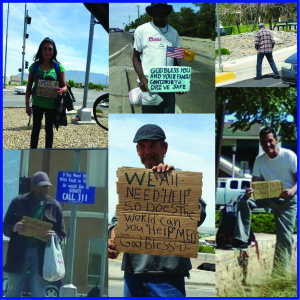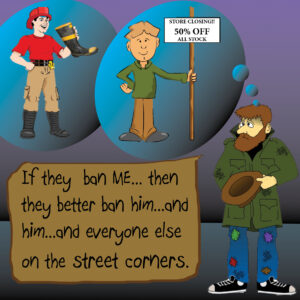By Jeremy Reynalds, Ph.D.
Founder and CEO
Joy Junction Inc.
 A proposal heading to the City Council aims to ban what it considers dangerous behavior by panhandlers across Albuquerque.
A proposal heading to the City Council aims to ban what it considers dangerous behavior by panhandlers across Albuquerque.
Sponsored by City Councilor Don Harris and delayed twice, the bill is scheduled to be heard at the Finance and Government Operations Committee on March 14.
If successful it would criminalize panhandling at freeway ramps, within medians or along high speed roads in Albuquerque.
“This is just about public safety,” Harris told the Albuquerque Journal. “We really want to avoid any value judgments. We wouldn’t allow anyone to solicit business from those places or engage in any kind of activity.”
That’s not the only thing they’re mulling. According to the City of Albuquerque’s Legislative Wish List they’re also mulling (as in asking the Legislature for) “funds for the acquisition of land and/or property for, and the operation of, a year-round emergency overnight shelter for homeless women, children and families.”
When asked about this by a Joy Junction administrator, the City of Albuquerque’s Tom Menicucci said, “I did hear back from the administration and at this time they are not working on a women’s shelter. To the best of their memory the issue came up through Council. I will pass your questions on to the people who provided me the information. However, one person is on vacation so I may not be able to get back to you until early February.”
This uncertainty about who raised the need for additional shelter is rather disturbing, as in a Jan. 4 report by KOB’s Caleb James, Councilor Brad Winter was quoted as saying that Albuquerque’s legislative priorities are chosen by a committee of three councilors and three city administrators, including chief administrative officer Rob Perry.
In a Jan. 8 2016 letter to Joy Junction, Menicucci said the same issue had been raised three times before-making this try the fourth attempt. This is troubling, because the ongoing call for additional shelter came two years after I first denounced Albuquerque Mayor R J Berry’s initial incarnation of Heading Home. Maybe it’s absolute coincidence. Who knows?Knowledgeable sources say there’s little chance of such a request succeeding this year, and even if it was to do so, it would take quite a long time to start another shelter. Why ask for project funds at all? That’s what I’m trying to find out.
This issue notwithstanding, there are some good things mentioned in Bill R-16-7, and Joy Junction supports two of them.
But getting back to the panhandling. I initially told an area reporter who asked me for my thoughts about the bill that if the only goal of Harris’ bill was safety, then the overall concept was good. Nonetheless, I added, I still had some problems with certain parts of the bill, and thought it needed to be fine tuned if it was to survive a court challenge and preserve the right of panhandlers as well.
However, the more I thought about this potential legislation, the more troubled I became.
Let’s face it. If panhandling is criminalized, so doing would end up putting homeless people into the criminal justice system and thrusting them into a cycle of fines they could never pay.
Another concern is if Harris’ proposal does become law, will the ordinance be enforced equally, regardless of who stands in the median?
An Albuquerque Journal editorial titled “Roadways not for soliciting” while dubbing Harris’ proposal “a smart move” said it’s one “that should apply to everyone.” More specifically, the Journal wrote, the proposal should be amended to cover charities or those who want to “to drum up interest in a business.”
While the ACLU of New Mexico says it is still considering all the aspects of the bill, Executive Director Peter Simonson told me by email that Harris’ bill is “redundant,” as Albuquerque already has a law that addresses public safety issues around the panhandling of motorists.
Simonson said because of the broad and vague nature of the proposed legislation, it might also infringe on free speech rights. “Soliciting money is a form of speech which is protected by the 1st Amendment,” he added.
He echoed the Journal’s need for universal enforcement if the proposed ordinance is enacted. “What’s quite clear is that if the city enforces the law only against people who appear to be homeless or poor, but not against others who solicit money on medians, at off ramps and along roadways, it will certainly be violating constitutional rights. That means churches will no longer be able to solicit in those contexts. No more firefighters trying to ‘fill the boot’ on street corners.” 
So is Harris’ bill really about safety, or is this all part of a concerted attempt to rid the city of its highly visible panhandling problem?
Let’s take a look back. Earlier this year, Berry launched a program encouraging the homeless to call 311 for available shelter options. What the signs fail to mention is that 311 is only open six days a week and from 6 a.m. to 9 p.m. How would you feel if when calling at 3 a.m. you got an answering machine? I’d be pretty discouraged.
In an attempt to investigate the efficacy of the program, I had some of my staff pose as undercover homeless people in need of food and shelter. They were routinely directed by 311 to agencies that were closed for the day, or ones inappropriate for the need stated.
When one local news affiliate questioned the administration about what the homeless should do if they needed help during the time 311 isn’t available, the suggestion was to call our already overworked police department. Shouldn’t that “option” have been mentioned on all those prolific blue signs?
While directing people to shelters and other agencies, the Berry administration has also repeatedly failed to address the issue of what to do with panhandlers whose mental health issues prevent them from using a shelter. For a variety of reasons, some people need to sleep out in the open and be on their own.
After a mentally ill homeless man was shot by Albuquerque Police Department officers in the Sandia Foothills, the city received an enormous amount of negative attention.
Perhaps it’s because of that tragedy that Albuquerque, as the New York Times put it, has decided to “recalibrate” its approach toward homelessness, offering panhandlers part time jobs twice a week. That move has been met with national and all laudatory media coverage, while still failing to answer basic questions.
The most interesting headline and potentially ironic headline was from the Huffington Post which read, “Instead Of Arresting Panhandlers, Albuquerque’s Giving Them Jobs.”
Okay, jump ahead with me for a moment. Say Harris’ ordinance becomes law and because of its almost all-encompassing mandate against panhandling, the practice (and all those blue signs) begin to die a quick death in Albuquerque.
The mayor’s vaunted jobs for panhandlers program dies a fairly swift death. After all, the program is built on offering panhandlers work, right?
The let’s not forget, if the panhandling ordinance becomes law and is enforced, our troubled and overworked police force go back to arresting panhandlers and pushing them over the already wobbly precipice that doubles as their life into the criminal justice system.
Oh, and the safety issue?
According to data from the National Highway Traffic Safety Administration in 2013, New Mexico had 49 pedestrian fatalities out of a total of 310 total traffic fatalities.
A 2014 report from local media dealing with panhandling deaths didn’t deal whether any may have been from panhandling.
I was also unable to find any information related to pedestrian deaths from panhandling at the Accident Data Center.
With that in mind, isn’t it maybe a little premature to propose new legislation based on what appears to be such a lack of solid evidence?
Admittedly, I did find a few stats from other states. A panhandler was tragically killed earlier this year in Orlando while reaching for money.
And the recent death of a panhandler in Oklahoma City came as the Oklahoma City Council was considering an ordinance limiting panhandling. While initially put on hold, the ordinance, prohibiting most activities in medians near intersections, was passed Tuesday morning.
The American Civil Liberties Union of Oklahoma said the ordinance will impose unconstitutional limits on free speech.
So who’s the only one who appears to really gain from all of this? Seems to be Mayor Richard J. Berry, who gets a bonanza of unquestioning national press while providing a few people jobs and at the same time, as one Facebook respondent put it (unless he speaks out against it), “support(ing) the criminalization of the way many more people survive.”

